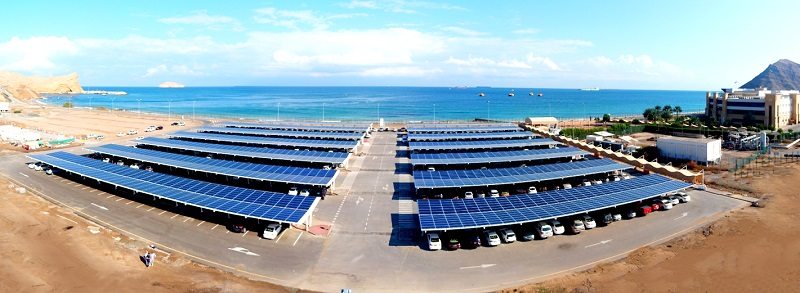

Petroleum Development Oman (PDO) on 3 January officially opened its first solar car park at its headquarters in Muscat, as part of the Omani national oil company's push towards clean energy, and more importantly to meet the power generation demands of the gas-starved sultanate.
Thousands of solar panels have been installed in car parking lots at Mina al-Fahal to provide power for PDO’s office buildings. PDO claims the project will save more than 3.1 million cubic metres of gas (mcm/y) a year, enough to provide electricity for almost 1,000 homes.
The initiative will also cut carbon dioxide emissions by 6,662 tonnes annually, the equivalent of taking more than 1,400 cars off the road or planting almost 173,000 trees.
The renewable energy scheme was executed as a joint venture by Spanish company Elecnor in partnership with Omani firm Rukun al-Yaqeen (RAY) International. It involved installing a total of 19,500 solar photovoltaic (PV) modules to the canopies of 2,054 parking lots and is the largest solar scheme at a single location in Oman spanning an area of 37,830 square metres.
The solar plant requires minimum effort to operate and maintain at negligible operating costs for a projected 25-year life cycle.
The 6 megawatt installed peak (MWp) solar project, which will generate 9.48 million electrical units (kWh) per year, is not the first solar power utility project in Oman though. PDO has also become the first owner-operator in the region to adopt a solar-based enhanced oil recovery (EOR) methodology for one of its oilfields.
Late last year, PDO announced the completion of the first phase of its ‘Miraah’ project, developed by technology provider US firm Glasspoint, that harnesses the sun’s rays for producing steam within a glasshouse structure to recover oil from the tricky geological formation of PDO’s Amal oilfield in southern Oman. The Miraah (meaning mirror in Arabic) project too is directed at replacing the expensive gas-based EOR method that PDO used previously.
Natural gas production in the gas-short Middle East has failed to keep pace with historical demand growth, a trend that is likely to continue. With the exception of Qatar, all other GCC states are therefore investing significantly into power generation projects, and looking at alternative energy sources to meet robust electricity demand.
The Khazzan tight gas project in Oman operated by BP is perhaps the biggest and the latest gas project to be operating in the Sultanate at present.
You might also like...

Qiddiya evaluates multipurpose stadium bids
26 April 2024

Al Ula seeks equestrian village interest
26 April 2024

Morocco seeks firms for 400MW wind schemes
26 April 2024

Countries sign Iraq to Europe road agreement
26 April 2024
A MEED Subscription...
Subscribe or upgrade your current MEED.com package to support your strategic planning with the MENA region’s best source of business information. Proceed to our online shop below to find out more about the features in each package.




